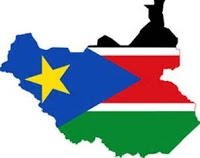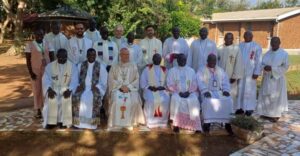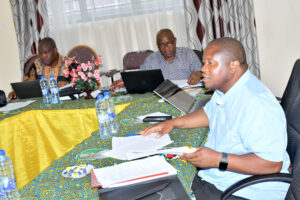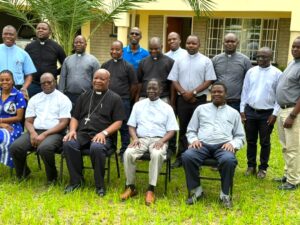SOUTH SUDAN: Catholic Bishops Urge for True Peace

The South Sudan Catholic Bishops have appealed for true peace to prevail across South Sudan as part of the Revitalized Peace Agreement, signed in September 2018. Speaking on behalf of the Bishops, the Metropolitan Archbishop of Juba, Most Rev. Paulino Lukudu Loro said on Thursday, February 28 that despite the signing of the agreement by the warring parties, violence still continue in some parts of the country.
“The value of human life and dignity is forgotten and human rights abuses are occurring with impunity,” Archbishop Lukudu said, adding that the economic hardships remain; peace isn’t truly lasting.
He pointed out that politics is not the only solution for the conflict in the country, but conversion, or rather, change of heart is what will bring true peace.
He advises the parties to unite and show political will; to act against the spoilers within their ranks; and to promote the democratic rights of the people such as freedom of speech.
Archbishop Lukudu added that the media’s role should be recognised to examine and avoid the conflicts that occurred in past years, and that channels of communication with individual groups who have not signed the peace deal should be opened.
~End~
Source: Catholic Radio Network
PASTORAL MESSAGE
FROM THE SOUTH SUDAN CATHOLIC BISHOPS’ MEETING
JUBA, 26TH-28TH FEBRUARY 2019
PREAMBLE
We the Catholic bishops of South Sudan, meeting in Juba from 26th to 28th February 2019, have reflected on the current situation in our country to prayerfully discern the way forward. We have listened to reports and briefings from our various dioceses and pastoral agents. We address our message to our own Christians, to all South Sudanese, to our neighbours and friends in the international community, and to all people of good will. We also humbly share this message with our Holy Father Pope Francis as we know of and are grateful for his deep personal interest and concern for South Sudan.
CONCERN
We remain extremely concerned. We welcome the signing of the Revitalised Agreement on the Resolution of Conflict in South Sudan (R-ARCSS) as a step forward. However the concrete situation on the ground demonstrates that it is not addressing the root causes of the conflicts in South Sudan. It propagates the “power sharing” model which encourages the Parties to bargain over posts, positions and percentages rather than working for the good of the country. Some Parties to the agreement claim that they were not consulted about the agreement, they were pressured into signing it, and they are not committed to it. Furthermore, the implementation of the agreement is far behind schedule. While the level of open conflict has reduced, the Cessation of Hostilities agreement is not holding, and all parties are involved either in active fighting or preparations for war. The value of human life and dignity is forgotten as human rights abuses continue with impunity, including murder, rape, widespread sexual violence, looting and the occupation of civilian land and property. Organised crime is on the increase. While there is a great deal of talk about peace, actions are not matching words, and we fear that our leaders on all sides have other hidden agendas. While people welcome the signing of a peace agreement, there is a sense of hopelessness that this agreement, like so many before it, will not succeed. While funds are spent on the military and corruption continues amongst the elite, ordinary people face hardships as the economy continues to collapse around them. The Church stands with the poor and oppressed, the ordinary people. The “peace” which is being spoken of is not a true and lasting peace. It is not the shalom of the Gospel, the peace which Jesus speaks of: “Peace I bequeath to you, my own peace I give you, a peace which the world cannot give, this is my gift to you” (John 14:27). We fear that this peace agreement is fatally flawed in itself and cannot bring true peace; we fear also that the current leadership does not have the will to implement peace.
CONVERSION
Politics alone will not resolve the conflicts in South Sudan. While many ordinary people long for peace, there is no will or commitment for peace amongst many of our leaders, hate speech and propaganda abound, and there is a thirst for revenge amongst many of our communities. What is needed is conversion, a change of heart, amongst individuals and communities. This message is at the core of the Church’s ministry. In our teaching and preaching, in every interaction we have with our fellow human beings, this must be a priority. Only then will the political efforts bear fruit. “You were to put aside your old self, which belongs to your old way of life and is corrupted by following illusory desires. Your mind was to be renewed in spirit” (Ephesians 4:22-23).
THE REVITALISED AGREEMENT ON THE RESOLUTION OF CONFLICT IN SOUTH SUDAN (R-ARCSS)
We are not politicians, but as pastors it would be remiss of us not to examine, analyse and comment on the R-ARCSS. We are now halfway through the eight-month Pre-Transitional Period. If we take stock of what has been achieved, it is worrying.
Many of the committees and commissions mandated by the R-ARCSS have not been set up at all, have been set up late, or have not begun their work. The Permanent Ceasefire has not been observed. All political detainees and prisoners of war have not yet been released. All non-South Sudanese armed groups were supposed to depart from the territory of South Sudan within 45 days. This has not taken place. All Parties are supposed to cease security forces recruitment and training of recruits. This has been violated by some parties, including the Government. Cantonment of forces was supposed to be completed within 30 days but has barely begun. Demilitarisation of civilian centres and collection of long and medium range heavy weapons were supposed to be completed within 45 days, but up to now civilian centres and houses are still occupied by the troops belonging to some parties to the agreement, especially the Government and SPLM/A-IO. Within 15 days, the Joint Transitional Security Committee (JTSC) was supposed to set the eligibility criteria for candidates willing to serve in the unified national army, national security service, police, prisons, fire brigade and wildlife services, and the joint training of the necessary unified forces was supposed to commence within 60 days. Up to now the training has not started.
Parties are not creating conditions for sustainable peace which would thereby prevent the outbreak or relapse of violent conflict again. On the contrary, we fear that “divide and rule” tactics may be in play.
CHALLENGES
All of these omissions and delays are deeply worrying. It is clear to us that most of the activities meant to be performed so far during the Pre-Transitional Period are not accomplished. This is likely to impact negatively on the subsequent activities whether during the remaining time for the Pre-Transition or the beginning of the Transitional Period.
We believe that one of the key drivers of conflict is the number of States and the boundaries between them, which has created divisions within our communities. The Independent Boundaries Commission (IBC) was due to be set up within two weeks, but this has not been done. Given that the issue of the number and boundaries of the States in South Sudan was a very contentious issue during the peace talks, and the agreement of the Parties that it must complete its task within the Pre-Transitional period, it is a concern that IGAD has failed to form the IBC on time. The consequences of not settling the controversial issue of the 32 States before the onset of the Transitional Period, and of not fully consulting the people on the ground, are too grave to be ignored.
The Parties agreed on a formula by which all armed forces of the warring Parties were to be unified to create a nucleus national army for South Sudan within eight months so as to be deployed before the end of the Pre-Transition to provide reliable security to all Parties, especially the Opposition, and avoid the repeat of the tragic July 2016 military confrontation that caused the breakdown of ARCSS and the spread of war into many parts of the country. Up to this time, nothing has been done in this respect. We doubt whether the Opposition can realistically be expected to return to Juba to form the Reconstituted Transitional Government of National Unity (R-TGoNU) before the unified force is operational, and indeed Article 2.2.1 of R-ARCSS ties the end of the Pre-Transitional Period to the completion of “training and redeployment of the necessary unified forces” and stipulates further that “this provision prevails on any other contrary text”. This matter poses a real challenge to all the Parties, as we doubt whether it can be made operational during the remaining three and a half months of the Pre-Transition.
The government is required by the R-ARCSS to contribute to the funding of the implementation of the Agreement. Up to now the government has contributed only a very small amount to the total budget. This poses a challenge that could threaten the whole Agreement, and also raises the question of how the national revenue is actually being spent.
The Agreement on Cessation of Hostilities, Protection of Civilians and Humanitarian Access (COHA) provides that relevant meetings shall be held “outside South Sudan to ensure full participation of all the Parties”. A similar provision for all the Committees/Mechanisms of the R-ARCSS was included in the documents that were discussed during the HLRF peace talks. While that provision does not appear in the final text of R-ARCSS, we believe that the spirit of it should remain, namely that the Opposition cannot feel secure meeting in South Sudan before the beginning of the Transitional Period. Yet almost all the meetings of these committees and mechanisms are now taking place in Juba, where Opposition delegates may not feel secure.
Continuous violations of the R-ARCSS have been observed in key areas of the Agreement. For example, the fighting still going on in some areas such as Yei and denial of access to the Reconstituted Ceasefire and Transitional Security Arrangements Monitoring and Verification Mechanism (R-CTSAMVM) to carry out its mission of verifying claims of violations of security arrangements. There must be clear and enforceable consequences to non-compliance. The Luri incident in December 2018, a few kilometres from Juba, in which international monitors were stripped, beaten and humiliated was an indicator that IGAD needs to resolve this matter.
Dissemination of the R-ARCSS is not being carried out in any cohesive or impartial manner. People are ignorant of its content, and in some cases are being misled about it.
General Thomas Cirillo (NAS) and others did not sign the final Agreement. However, they have indicated that they are ready to talk on a new agreement. We believe that every effort should be made to engage them in negotiations, and we condemn any violence between them and other Parties in violation of the ceasefire. Peace cannot be made by killing people, and we demand a nonviolent dialogue.
The economic situation in the country concerns us greatly. Peace should provide people with their basic needs and services, and this is not happening. Many people still remain in POC camps due to fear or the fact that their homes have been destroyed or occupied and they have nothing to return to, and are still being newly displaced, whether through insecurity, the grabbing of their land and property, economic or food security issues. IDPs can also be found in many parts of South Sudan where there are no formal camps. There are also millions of people still in neighbouring countries as refugees. Civil servants have not been paid for months, some government officials have not been paid for years, while others such as Members of Parliament are still being paid and government resources are being used for other purposes. This has also contributed to spiritual, psychological and physical health issues.
We are also concerned at the environmental degradation of our country and the exploitation of natural resources, whether from the illegal commercial-scale poaching of our wildlife, the cutting down of our forests by foreign interests or by illegal charcoal-making, or the pollution of our land by the oil companies and gold-mining. Care for Creation is an important component of our Catholic Social Teaching as well as a global imperative as the world suffers from climate change.
We are concerned that humanitarian access is still being obstructed to many areas across the country. Children are not receiving education as schools have been destroyed or occupied by the army. Parents do not have access to health facilities for childbirth and caring for their children.
While we thank IGAD for its efforts, we note that the Government of South Sudan is a member of IGAD, and that other IGAD members have their own national interests. It thus becomes difficult for IGAD to act as a truly impartial mediator.
THE WAY FORWARD
We offer the following recommendations and commitments:
- The President of South Sudan, as our national leader, should constructively engage all stakeholders and Parties to the R-ARCSS to ensure that each party fulfils what it agreed to do in signing the revitalised agreement.
- The value of traditional leaders and chiefs must be recognised and factored in to the implementation process through various confidence-building mechanisms.
- The existing National Dialogue can be instrumental to the implementation process, but it should be genuine and inclusive to serve as a building block in the pursuit of trust building. Opposition parties must be fully included.
- Traditional South Sudanese conflict resolution mechanisms and inter-tribal dialogue practices should be used to deepen understanding and contribute to the full implementation of the Agreement. Academia, researchers, church personnel and other experienced practitioners should be involved to provide recommendations and examples of best practice.
- The Parties should collectively show the determination and necessary political will to act against spoilers from within their own ranks. There should be alignment of message and action of the Parties to counter forces that seek to disrupt or delay implementation.
- The Parties should ensure that all the remaining political detainees and prisoners of war are released, and those with criminal cases are given transparent and timely due process. Any who have “disappeared” while in detention must be traced and accounted for.
- For confidence building purposes, we recommend to officially announce the lifting of State of Emergency, to ensure that the political space needed for exercising the individual’s democratic rights and freedom of speech and freedom of assembly are in place, and the role of a responsible media is duly recognised.
- The Parties should examine the mistakes of the recent past, draw lessons, and develop early-warning mechanisms to avoid the triggers that led to the conflict of July 2016.
- The Church and other faith-based leaders, eminent personalities, and civil society, women’s and youth groups, should be given a prominent role in national reconciliation and the confidence-building effort.
- Better publicise violations of the R-ARCSS and hold those responsible accountable.
- Maintain open channels of communication with individuals and groups who have not signed the R-ARCSS.
- Ensure that the decision from the IBC on the number of states in South Sudan and their boundaries is responsive to citizens’ views on the issue. Unless the people themselves are properly consulted, this will continue to be a source of conflict.
- Expedite the establishment of appropriate transitional justice mechanisms, including restorative and traditional forms of justice.
- Subject the deployment of troops from neighbouring countries in South Sudan, particularly the Sudanese army in the oilfields and the UPDF in Yei River state, to the highest levels of scrutiny.
- Catholic Church will act to prepare parties to the R-ARCSS, and reach out to non-signatory parties, for genuine and open dialogue in impartial forums so as: to initiate an acceptable platform for dialogue and deliberations; establish the obstacles to the peace process; identify gaps and difference among stakeholders; mobilise the stakeholders into a genuine negotiation table; build trust between the parties; identify and engage a team of respected peace mediators who will reach out to the parties and develop a strategy of addressing the listed concerns, and who must be non-partisan, ethical and respected, and have past experience in mediation and conflict resolution and have knowledge of South Sudan political affairs.
- We commend the efforts of our Justice and Peace Commissions at national and diocesan level; and of all the peace and reconciliation activities being carried out by our pastoral personnel and laity at local level throughout the country, often under great hardships; and we recognise them as part of our national peace and reconciliation strategy. Catholic Church will continue to use its preaching, teaching and pastoral networks to create an atmosphere conducive to peace and reconciliation at every level.
- While pursuing its own initiatives, the Catholic Church will continue to play its part in the South Sudan Council of Churches’ Action Plan for Peace.
All these measures, if properly implemented will create a conducive political, social, and economic environment for the people of South Sudan, especially refugees and internally displaced, to enjoy the dividends of peace.
BLESSING
This is our message to all stakeholders, including our political and military leaders, the signatory Parties to the R-ARCSS and those Parties who have not signed, our neighbours in IGAD, our friends in the international community, and all people of good will. We fear that the current peace infrastructure mediated by IGAD is fatally flawed and we urge all stakeholders and friends of South Sudan to collaborate to seek a new model, a change of narrative, for true peace which goes beyond the R-ARCSS. We believe that this will give hope to our people. May God bless you all, and may “the peace of God, which surpasses all understanding… guard your hearts and your minds in Christ Jesus” (Philippians 4:7).


